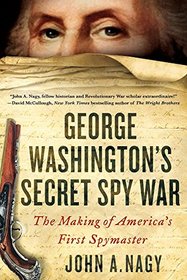Leo T. reviewed George Washington's Secret Spy War: The Making of America's First Spymaster on + 1775 more book reviews
The author published previous volumes on espionage, this being his capstone that was in press when he died in 2016. While he includes the scholarly bells and whistles, it is easy to read. He shares recent research such as LTG Palmer's evaluation of Washington as a strategist(2012).
I myself read the Introduction and Conclusion, offering a succinct overview, and two chapters, one on the use of Quakers as spies. This book could become tedious unless the reader is highly interested in the subject, but I believe any chapter would give the reader a feel for the subject after reading the Intro and Conclusion. I also read with interest of Washington's career as a LTC on Lt. Governor Dinwiddie's staff, when he dealt with the French while in the distant Ohio country among Indian tribes that had varying interests.
Mr. Nagy debunks the belief that Washington 'out-spied' the Redcoats. "The British had more money in hard currency to pay for intelligence and thus had more spies. Washington, though, was better at the military application of the intelligence his spies brought him. By comparing intelligence from several spies, he was able to determine what information was true and what was false. He was able to identify the deceptions the British sent to him. When needed, his spies helped deliver false information to the enemy."
Bibliography, endnotes (some are explanatory rather than merely citations), index.
I myself read the Introduction and Conclusion, offering a succinct overview, and two chapters, one on the use of Quakers as spies. This book could become tedious unless the reader is highly interested in the subject, but I believe any chapter would give the reader a feel for the subject after reading the Intro and Conclusion. I also read with interest of Washington's career as a LTC on Lt. Governor Dinwiddie's staff, when he dealt with the French while in the distant Ohio country among Indian tribes that had varying interests.
Mr. Nagy debunks the belief that Washington 'out-spied' the Redcoats. "The British had more money in hard currency to pay for intelligence and thus had more spies. Washington, though, was better at the military application of the intelligence his spies brought him. By comparing intelligence from several spies, he was able to determine what information was true and what was false. He was able to identify the deceptions the British sent to him. When needed, his spies helped deliver false information to the enemy."
Bibliography, endnotes (some are explanatory rather than merely citations), index.





